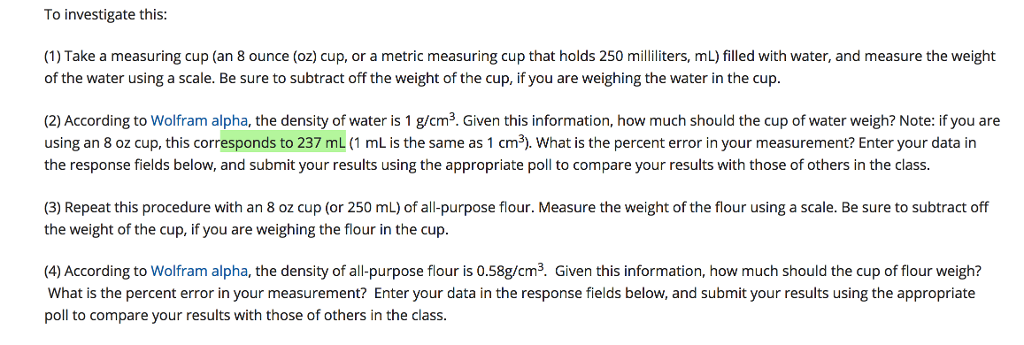Question
1. How much did your cup of water weigh? Enter your result in grams but without writing out the unit. I.e., if your water weighed
1. How much did your cup of water weigh? Enter your result in grams but without writing out the unit. I.e., if your water weighed 5 grams, enter "5" not "5 g" or "5 grams":
2. How much is a cup of water supposed to weigh based on the volume that you measured and the density of water as provided by Wolfram Alpha? Enter your result in grams but without writing out the unit:
3. What is the percent error in your measurement? Note that you calculate the percent error by dividing the difference between the observed and expected values by the expected value, and multiplying the result by 100. Enter your result in percent but without writing out the unit. I.e., if your percent error was 12%, enter "12" not "12%" or "12 percent":
4. How much did your cup of flour weigh? Enter your result in grams but without writing out the unit:
5. How much is a cup of flour supposed to weigh based on the volume that you measured and the density of all-purpose flour as provide by Wolfram Alpha (0.58 g/cm3)? Enter your result in grams but without writing out the unit:
6. What is the percent error in your measurement? Note that you calculate the percent error by dividing the difference between the observed and expected values by the expected value, and multiplying the result by 100. Enter your result in percent but without writing out the unit.

To investigate this: (1) Take a measuring cup (an 8 ounce (oz) cup, or a metric measuring cup that holds 250 milliliters, mL) filled with water, and measure the weight of the water using a scale. Be sure to subtract off the weight of the cup, if you are weighing the water in the cup. (2) According to Wolfram alpha, the density of water is 1 g/cm. Given this information, how much should the cup of water weigh? Note: if you are using an 8 oz cup, this corresponds to 237 ml (1 mL is the same as 1 cm). What is the percent error in your measurement? Enter your data in the response fields below, and submit your results using the appropriate poll to compare your results with those of others in the class. (3) Repeat this procedure with an 8 oz cup (or 250 mL) of all-purpose flour. Measure the weight of the flour using a scale. Be sure to subtract off the weight of the cup, if you are weighing the flour in the cup. (4) According to Wolfram alpha, the density of all-purpose flour is 0.58g/cm. Given this information, how much should the cup of flour weigh? What is the percent error in your measurement? Enter your data in the response fields below, and submit your results using the appropriate poll to compare your results with those of others in the class.
Step by Step Solution
3.43 Rating (159 Votes )
There are 3 Steps involved in it
Step: 1
Solution 1 The weight of my cup of water is 224 gram...
Get Instant Access to Expert-Tailored Solutions
See step-by-step solutions with expert insights and AI powered tools for academic success
Step: 2

Step: 3

Ace Your Homework with AI
Get the answers you need in no time with our AI-driven, step-by-step assistance
Get Started


